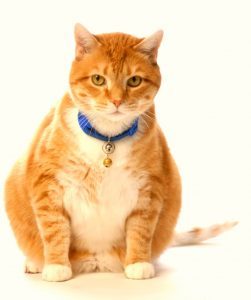 When people have a feline pet in the home, it’s only natural to think of them as a beloved member of the family. Of course, it’s common for people to want to express the love they have for their cat in the form of extra treats and a food bowl that’s always filled with their cat’s favorite food. Over time, however, with the 24/7 availability of food, coupled with extra treats and a lack of consistent exercise, more than a few cats will begin to put on weight, to the point where they’re considered obese. If you’re concerned that your furry feline has developed issues with obesity, the West Park Animal Hospital in Cleveland (also serving the North Olmsted, Berea, Rocky River, Lakewood, and Fairview Park areas) wants to help.
When people have a feline pet in the home, it’s only natural to think of them as a beloved member of the family. Of course, it’s common for people to want to express the love they have for their cat in the form of extra treats and a food bowl that’s always filled with their cat’s favorite food. Over time, however, with the 24/7 availability of food, coupled with extra treats and a lack of consistent exercise, more than a few cats will begin to put on weight, to the point where they’re considered obese. If you’re concerned that your furry feline has developed issues with obesity, the West Park Animal Hospital in Cleveland (also serving the North Olmsted, Berea, Rocky River, Lakewood, and Fairview Park areas) wants to help.
Obese Cats Have Grooming Difficulties
Cats are fastidious animals, and their ability to regularly clean and groom their skin and fur is especially important to them. Normally, healthy cats can keep their fur and skin in good condition through their instinct for self-grooming. With obese cats, however, this may not necessarily be the case. The more excess weight cats carry, the more difficult it is for them to perform their daily grooming.
A particularly troublesome issue may arise in obese cats because they often have difficulty grooming themselves after using the litter box. Over time, dried feces can build up on the fur around the rectum area, making it difficult, or even impossible, for a cat to maintain the high levels of cleanliness that help it feel healthy, happy, and relaxed. In particular, obese long-haired cats may have great difficulty in grooming themselves after elimination. Eventually, they may develop matted fur that emits a strong odor due to the dried feces tangled in their fur.
Cat Obesity and Joint Issues
Much like people, cats who are overweight for a long time may begin to develop joint issues. The excess weight they must carry with every step eventually takes its toll on their joints. Over time, an obese cat is much more likely to develop joint problems such as arthritis and other degenerative issues. The inability to move quickly, jump, and otherwise move their body normally only exacerbates the problem, making it likely they’ll gain even more weight.
Obese Cats and Diabetes
It may come as a surprise, but like humans, cats can also develop diabetes. Overweight cats are susceptible to developing insulin resistance, which can eventually lead to the development of diabetes. Feline diabetes is a serious illness. Left untreated, it can lead to life-threatening complications or even early death. A diagnosis of feline diabetes may also mean the cat’s owner will need to give their cat regular insulin injections.
Liver Issues and the Obese Cat
Obesity can also lead cats to develop fatty liver (hepatic lipidosis). This is a serious condition that may occur after an overweight cat has a reduced appetite, perhaps because of encountering a stressful situation such as moving to a different home, or the introduction of another pet. If an overweight cat abruptly stops eating, its excess fat is brought to the liver for nourishment. This excess fat can become trapped within the liver, which in turn causes damage and, in some cases, liver failure.
How to Help Your Overweight Cat
If you think your furry feline is overweight, it’s not a good idea to severely decrease the amount of food they eat every day. If you suspect your cat may be carrying extra weight, the best way to start them on the road back to good health and vitality is a visit with a professional veterinarian.
Having your cat evaluated by one of our caring staff members can help you determine whether your cat is truly overweight. If one of our staff decides your cat needs to lose weight, they can provide you with a measurable weight-loss plan to help you set healthy, obtainable weight goals for your cat. Our highly-trained staff can also evaluate your cat’s skin and fur to determine if they’re still able to groom themselves properly, or if they need additional assistance.
Our veterinarians can also provide suggestions on how to encourage your cat to become more active. Sometimes encouraging a cat to play is as simple as putting a little stimulating catnip in a large paper bag and letting them bat the outside of the bag, so they can pretend they’re catching a mouse or some other type of prey. Cats also love to play with strings and toys filled or rubbed with catnip. Another way to encourage play is to put some of their food inside a special food ball that encourages a cat to put forth effort to obtain the food.
Beyond increasing your cat’s activity levels, the other key to combatting cat obesity is to reduce the amount of food they eat or perhaps try different food. Our veterinarians can provide you with expert guidance on the optimal food that will help your cat lose excess weight. We also offer tips and suggestions on how much and how often you should be feeding your cat.
Have Your Cat Evaluated at West Park Animal Hospital
Here at West Park Animal Hospital, we understand the importance of the relationship between people and their pets. We want to do our part to extend that relationship as long as possible by providing expert guidance and the best possible services for pets and their owners. Our practice is AAHA certified, which means our veterinary care meets or exceeds the highest possible standards available in pet care today. We proudly serve West Park, North Olmsted, Berea, Rocky River, Lakewood, Fairview Park, Cleveland, and surrounding areas.
To schedule an obesity evaluation for your furry feline, please contact us today.

